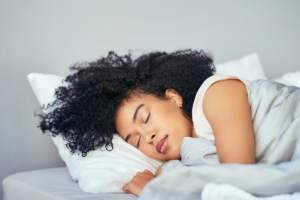What if the secret to better health, a sharper mind, and even weight loss wasn’t in your gym schedule or meal plans but in your sleep patterns? Sleep plays a critical—yet often overlooked—role in overall wellness. It repairs your body, strengthens your mind, and replenishes your energy, all while you rest.
This guide dives into why sleep and recovery matter and explores practical ways to optimize both. By the end, you’ll have actionable tips, including how to improve your sleep environment, tweak your nutrition, and integrate movement into your routine for better sleep. Let’s get started!
Why Sleep and Recovery Are Non-Negotiable for Wellness
When we think of living a healthier life, we often picture eating well, exercising, or staying hydrated. But sleep? It’s easy to dismiss those eight hours. Yet, sleep is like the foundation of a house—it supports everything else. Without it, your mental clarity, energy, and even your physical health start to crumble.
Sleep is when your body repairs muscle, balances hormones, and strengthens your immune system. Mentally, it breaks down stress and helps you process memories. Better sleep equals faster recovery, allowing you to gain more from your workouts and handle stress like a pro.
The Science Behind Sleep and Recovery
Your body runs on a roughly 24-hour cycle, known as the circadian rhythm. This internal clock regulates when you feel awake and when you’re ready to rest. It’s deeply involved in processes like tissue repair, brain detoxification, and even balancing appetite hormones.
Skipping quality sleep, though, throws that clock out of sync. This can leave you foggy, prone to sugar cravings, and more likely to feel sluggish. According to experts, adults should aim for 7–9 hours of uninterrupted sleep per night for optimal recovery.
Fun Fact:
REM (Rapid Eye Movement) sleep is the stage where dreams occur, but it’s also where your brain resets memory connections and creativity flourishes.
How to Improve Your Sleep Routine
Getting high-quality rest isn’t about simply heading to bed earlier. It’s about creating the right conditions for truly restorative sleep. Here’s how to get it right:
1. Set the Scene
Your bedroom should feel like a serene getaway. Keep it cool (around 65°F is ideal) and as dark as possible. Consider blackout curtains or a sleep mask. Remove screens an hour before bed to reduce blue light exposure, which disrupts melatonin production.
2. Stick to a Consistent Schedule
Going to bed and waking up at the same time daily helps regulate your body clock. Yes, even on weekends—your body loves consistency.
3. Adopt Sleep Hygiene Habits
Create a wind-down routine to signal your body it’s time for sleep. This could include reading, meditating, or light stretching. Avoid caffeine in the afternoon, and skip heavy meals or alcohol late at night to prevent disrupting your sleep cycle.
How Nutrition Impacts Sleep and Recovery
What you eat plays a surprising role in how well you rest. Certain foods can help you fall asleep faster and improve sleep quality.
Foods That Promote Restful Sleep:
- Bananas: Rich in magnesium, which relaxes muscles.
- Almonds: Contain sleep-inducing melatonin and magnesium.
- Oats: Carbohydrates help promote serotonin, a precursor to melatonin.
- Chamomile Tea: Known for its calming properties.
Simple Sleep-Friendly Snack Ideas:
- Greek yogurt with a drizzle of honey and crushed almonds.
- A slice of whole-grain toast with almond butter.
- A small bowl of oatmeal topped with sliced banana.
Pro Tip:
Avoid sugary and processed foods close to bedtime, as they can cause energy spikes that mess with your sleep.
Sleep and Weight Management
If you’re on a weight-loss or maintenance plan, don’t overlook sleep. Lack of sleep increases levels of ghrelin, the hormone that makes you feel hungry, and decreases leptin, the hormone that signals fullness. The result? It’s easier to overeat, especially foods high in sugar and fat.
Studies also show that poor sleep can slow your metabolism and reduce how well your body burns fat. Coupled with enhanced cravings, this sets the stage for struggles with weight management. Prioritizing those 7–9 hours of quality sleep could create an effortless edge in your wellness routine.
Movement and Sleep Go Hand in Hand
Physical activity benefits your sleep, but you don’t need to spend hours in the gym. Even light exercise, like a 20-minute walk or gentle yoga, can help regulate the hormones responsible for restful sleep.
If you’re juggling a busy schedule (looking at you, home cooks), try working movement into your day with these ideas:
- Stretch while waiting for your pasta to boil.
- Do calf raises or squats while tidying up.
- Take short post-dinner walks—it aids digestion and helps you wind down.
Exercise helps tire your body physically, making falling asleep easier at bedtime.
Tools and Techniques for Monitoring Your Sleep
With advancements in wearable technology, understanding your sleep patterns is easier than ever. Devices like Fitbit, WHOOP, and Oura provide insights into how long you sleep, your stages of sleep, and even your heart rate variability.
If wearables aren’t your thing, sleep-tracking apps (like Sleep Cycle) work just as well. The key is to use these tools to identify patterns and adjust your bedtime habits.




